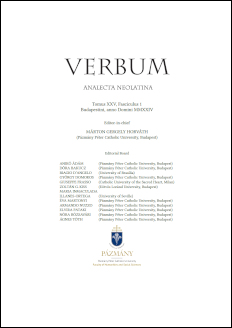Économie linguistique dans le français contemporain : approche lexicologique et orthographique
Published 07-06-2024
Keywords
- linguistic economy,
- principle of least effort,
- lexicon,
- orthography,
- contemporary French
How to Cite
Copyright (c) 2024 Laura Szabados

This work is licensed under a Creative Commons Attribution 4.0 International License.
Abstract
The aim of our work is to regroup and analyse several lexical and orthographic phenomena in contemporary French in a theoretical way, from the perspective of linguistic economy, one of the basic elements of language universals. As Zipf (1949) discovered, there is a natural correlation between a word’s frequent use and its brevity or simplicity, which depends on human nature and by which language can be better adapted to speakers’ needs for speed and simplicity in communication (cf. the principle of least effort). This tendency can be noted in contemporary French as well: in certain types of word formation, such as truncation or some neologisms; or in orthography, like Internet language, for example. However, it is always present simultaneously with other partially linguistic phenomena where economy is obviously not a priority, such as inclusive writing or politically correct language.
References
- Adegboku, D. (2011) : De l’économie en langue ou dans le langage : une linguistique “des temps qui pressent”. Synergies Afrique Centrale de l’Ouest 4 : 25–37.
- Anselme, R. (2019) : La troncation en français. Mémoire de master. Paris : Université Paris 7 Paris-Diderot.
- Bárdosi, V. & I. Karakai (2008) : A francia nyelv lexikona. Budapest : Corvina.
- Bouchard, C. (1989) : Une obsession nationale : L’anglicisme. Recherches sociographiques 30(1) : 67–90. https://doi.org/10.7202/056408ar
- Bully, P. (1969) : Zipf, créateur de la linguistique statistique. Communication et langages 2 : 23–28. https://doi.org/10.3406/colan.1969.3726
- Charaudeau, P. (2018) : L’écriture inclusive au défi de la neutralisation en français. Le Débat 2 : 13–31. https://doi.org/10.3917/deba.199.0013
- Debray, R. (2017) : Civilisation : Comment nous sommes devenus américains. Paris : Gallimard.
- Faudouas, J.-C. (1990) : Dictionnaire des abréviations courantes de la langue française. Paris : Maison du dictionnaire.
- Fridrichová, R. (2012) : La troncation en tant que procédé d’abréviation de mots et sa perception dans le français contemporain. Olomouc : Univerzita Palackého v Olomouci, Faculté de philosophie.
- Fridrichová, R. (2013) : À propos des homonymes issus de la troncation : À la recherche du mot d’origine. Nová Filologická Revue: časopis o súčasnej lingvistike, literárnej vede, translatológii a kulturológii 5 : 53–62.
- Merle, P. (2011) : Politiquement correct : Dico du Parler pour ne pas dire. Paris : Les Éditions de Paris-Max Chaleil.
- Zipf, G. K. (1949) : Human behavior and the principle of least effort. Cambridge : Addison-Wesley.
- https://www.academie-francaise.fr/actualites/declaration-de-lacademie-francaise-sur-lecriture-dite-inclusive (consulté le 23 mai 2021)
- https://www.enalyzer.com/home/#sidemenu=areamenu|area=survey (consulté le 18 décembre 2019)
- http://www.lefigaro.fr/langue-francaise/actu-des-mots/2017/11/23/37002-20171123ARTFIG00015-alain-rey-l-ecriture-inclusive-est-vouee-a-l-echec.php (consulté le 23 mai 2021)
- https://www.lejdd.fr/Societe/ecriture-inclusive-lacademie-francaise-denonce-un-peril-mortel-pour-la-langue-francaise-3476099 (consulté le 23 mai 2021)
- Le Petit Robert de la langue française et des noms propres (2021). Dictionnaires Le Robert. Édition en ligne. : https://petitrobert.lerobert.com/robert.asp (consulté le 24 mai 2021)


